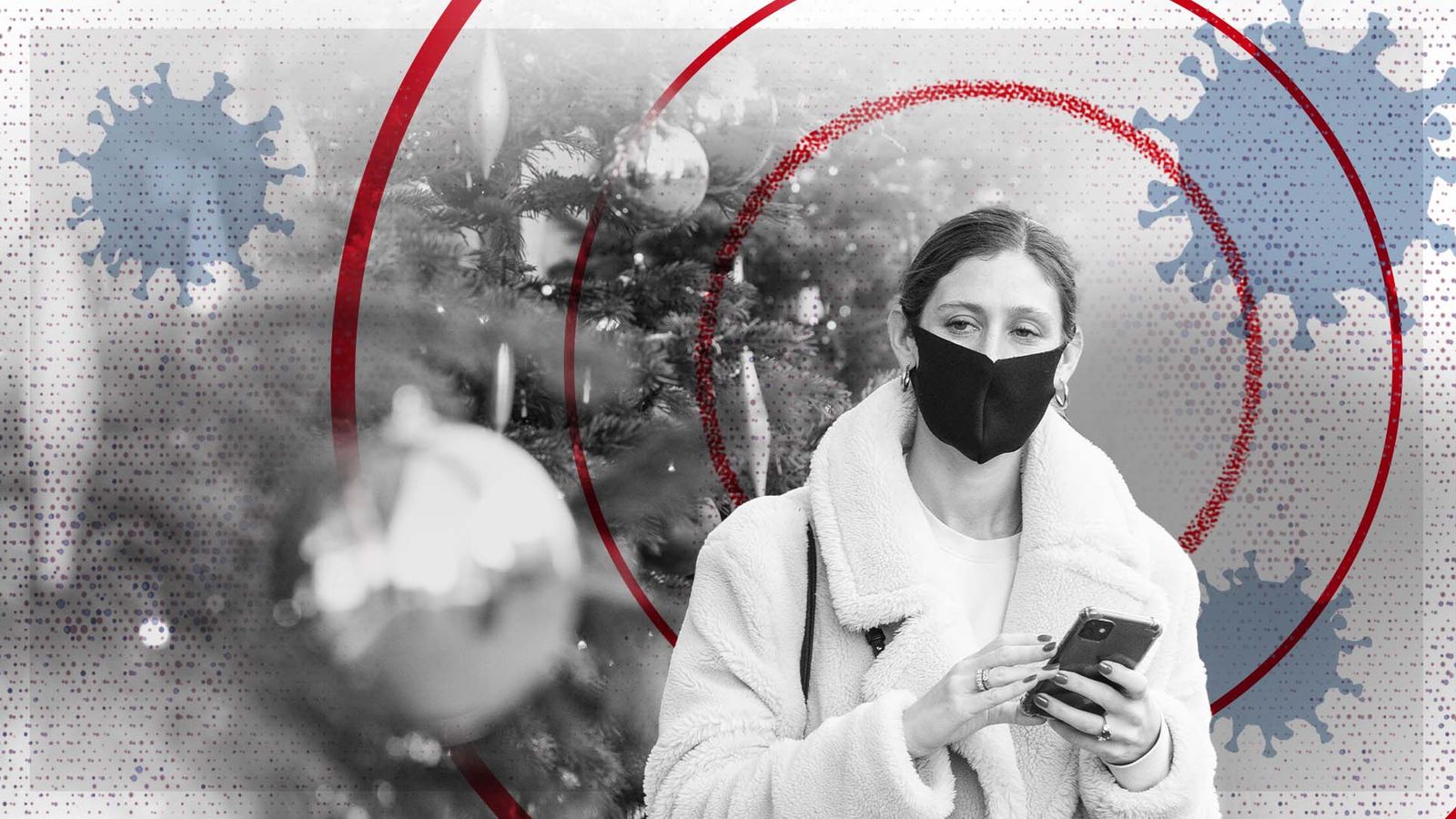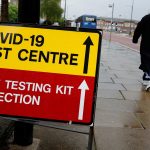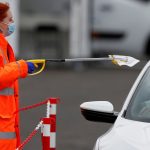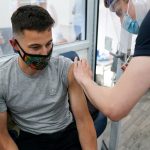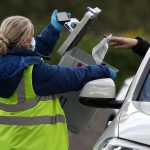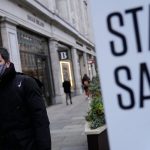The rules on face masks, working from home and self-isolation have been tightened across the UK in response to the Omicron variant.
In England, the government has brought in its Plan B, making face coverings a legal requirement in most indoor spaces and NHS COVID passes mandatory for late-night venues and large-scale events.
But scientists have described the threat of the new, more infectious variant as the “ultimate lose-lose situation”, with others claiming more “stringent” restrictions could be needed in the coming weeks.
Face masks and COVID passes: How are the rules changing in England?
Reports also claim that a ‘Plan B Plus’ is being considered by ministers and could be introduced in January.
Here Sky News looks at what a potential COVID ‘Plan C’ might look like and whether Plan B measures will be enough to curb the spread of Omicron.
What other restrictions could be brought in?
COVID-19: Omicron cases rise sharply by 448 and all coronavirus infections top 58,000 in latest UK daily figures
COVID-19: Heathrow says business travellers cancelling flights over testing rule fears
COVID-19: Scotland may face ‘tsunami of infections’ from Omicron variant, Nicola Sturgeon warns
Parts of the UK have already introduced tougher measures than those in Plan B for England.
On 10 December, Scotland’s First Minister Nicola Sturgeon announced the return of the 10-day isolation period for all contacts of a positive coronavirus case.
Currently in England, Wales and Northern Ireland, people only need to isolate if they have been in close contact of a suspected Omicron infection.
In Northern Ireland there is still a limit of 30 people allowed inside people’s homes. And in Wales COVID passes are required in cinemas and theatres, not just nightclubs and large music or sporting events, as is the case in England.
Care homes and hospitality
There are a number of other measures the government could take to mitigate the spread of Omicron in England – without a fourth lockdown.
“It’s good they’ve brought in more things, but there’s much more that they should have already been doing,” Dr Peter English, a former Public Health England consultant in communicable disease control, told Sky News.
According to The Daily Telegraph, the number of visitors allowed into care homes and other social care settings could soon be limited to three to protect vulnerable residents.
Follow the Daily podcast on Apple Podcasts, Google Podcasts, Spotify, Spreaker
In hospitality venues such as restaurants, cafes, pubs and bars, facemasks could once again be made mandatory – apart from when seated – and table-only service could resume.
The Daily Mail reports that in the New Year the NHS COVID app could be reintroduced across the hospitality sector, requiring people to ‘check in’ at venues, as they did previously.
Vaccine passports
From 15 December NHS COVID passes are required to get into nightclubs, other late-night venues, indoor events with more than 500 people, outdoor ones with more than 4,000 people and any event with more than 10,000 people.
They prove a person is fully-vaccinated or that they have had a negative lateral flow test result in the previous 48 hours.
The government could go a step further and only accept proof of vaccination, but this is very controversial, with politicians and scientists warning it could undermine public trust.
Countries such as Austria have effectively banned unvaccinated people from large parts of society by insisting on proof of vaccination for entry to restaurants and other non-essential services.
Germany is also reviewing the use of vaccine passports and is due to make a decision in the New Year.
Schools
Dr English claims a “huge amount” could be done to stop the spread of the virus in schools.
“Cases have been largely driven by school children since the summer,” he said.
“Other countries have put air filtration devices in every classroom. Our government promised that but has failed to deliver.”
He also said that ministers have got the rules on facemasks in schools “completely the wrong way around” – and they should be required in classrooms, not just communal areas.
“You’re much more likely to pass on the virus in an enclosed space like a classroom than in a corridor where you’re only passing people,” he said.
The relaxation of self-isolation rules earlier this year also means that children are expected to continue going to school if someone in their household tests positive.
“Parents should be allowed to take their children out of school for COVID reasons if they feel they should,” Dr English added.
Could Christmas be cancelled again?
After promising three households could mix between 23 and 27 December back in November 2020, the government enforced a ‘stay at home’ order for London and parts of the South East on 21 December, with more regions added on Boxing Day.
This was in response to the Alpha variant, first identified in Kent, which was far more infectious than the original Wuhan strain of the virus.
Boris Johnson has insisted that this Christmas will be “considerably better than the last”.
But scientists now estimate that cases of Omicron are doubling every two to three days, with COVID cases up by 8% and hospitalisations by 4% over the past seven days.
“Omicron will probably peak in late-December, around about Christmas and New Year,” Dr English claims.
“We’re going to have a terrible Christmas period of very high cases and people being very worried about it.
“The government is so determined to say we won’t have another lockdown.
“But we will probably have panic measures brought in around Christmas because we weren’t doing what we should have already been doing with the Delta variant.”
Scientists have repeatedly stressed hospitalisation numbers are the key factor in deciding what COVID measures to introduce.
And the government’s winter COVID plan states: “The government remains committed to doing whatever it takes to prevent the NHS from being overwhelmed.”
Will Plan B be enough to avoid another lockdown?
Speaking to Sky News’ Trevor Philips on Sunday, Professor David Spiegelhalter said asking people to work from home is “extremely effective” as it “halves the number of close contacts people have”.
Dr English says that and other current measures “might be enough to tip the balance”.
And Dr Lance Turtle, senior clinical lecturer in infectious diseases at the University of Liverpool adds that if people comply with Plan B properly it “could tackle a substantial part of the problem”.
“If you do fewer measures really well that may avoid the need for more dramatic measures later on,” he told Sky News.
He also warned of the other risks posed by another lockdown.
“The adverse effects of lockdown and the other non-pharmaceutical interventions are potentially very bad.
“People have really suffered. People stayed away from hospitals in the first wave and we’re dealing with the consequences of that now, as well as the problems around mental health.”
He said that giving boosters to as many people as fast as possible and providing more economic incentive for people to isolate would both help prevent tougher restrictions.
“We want to take as many infectious people out of circulation as possible, while doing as little economic damage as we can,” he said.
